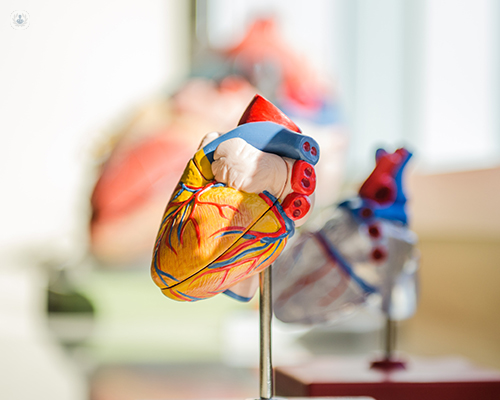Myocarditis: A quick guide
Written in association with:In her latest online article, leading consultant cardiologist Dr Teresa Castiello offers her expert insight into myocarditis. She explains some of the most pressing concerns for patients, including what causes inflammation of the heart, when an ECG should be considered, and the different treatment options available.

Why is my heart inflamed? What's the cause?
Myocarditis is an inflammation of the heart muscle, specifically the ‘myocardium’. It can be very mild or very severe, and understandably, it can be a concerning health issue. Although it often resolves on its own, it is important to understand the causes, and potential complications, and carry out correct diagnostic tests and treatment options associated with this condition.
The most common cause of myocarditis is a viral infection, such as a coxsackievirus or an adenovirus. COVID-19 has been associated with myocarditis too. These viruses can enter the body through the nose or mouth and travel to the heart. Once in the heart, the viruses can damage the heart muscle cells, leading to inflammation.
Other causes of myocarditis can include bacterial or fungal infections, certain medications, autoimmune diseases (such as lupus or rheumatoid arthritis) and exposure to toxins. In many cases, the exact cause may not be identified. The inflammation can weaken the heart muscle, affecting its ability to pump blood effectively.
What blood tests are typically ordered, and what do they say about my heart?
When myocarditis is clinically suspected some blood tests can support and help clarify the diagnosis. Key tests to evaluate potential heart damage include cardiac enzymes, such as troponin; creatine kinase and NTproBNP can be also useful to assess heart damage or pump failure. Other tests can help assess markers of inflammation, such as C-reactive protein (CRP) or erythrocyte sedimentation rate (ESR); viral or bacterial serology tests and autoimmune antibody tests can potentially identify underlying causes.
Should an electrocardiogram be done to see if the heart muscle inflammation may be disrupting how my heart beats?
Yes, an electrocardiogram (ECG) should be done to see if heart muscle inflammation is disrupting how the heart beats. An ECG is a simple test that measures the electrical activity of the heart. It can be used to detect arrhythmias (abnormal heart rhythms) and other problems with the heart's electrical system.
It is however important to emphasise that diagnosis is made by clinical signs and symptoms and electric changes shown on ECG and cardiac MRI scans, once coronary disease has been excluded. In selected cases, endomyocardial biopsy, a heart tissue sample, is indicated and it offers a clear diagnosis of the underlying cause.
What treatments can help prevent permanent damage or scarring to the heart muscle?
In the milder form, there may not be any scarring of the heart, or the scarring can resolve well with rest and some over-the-counter anti-inflammatory medication. It is important to refrain from exercise until the heart is healed.
However, treatment and sequelae of myocarditis depend on its severity and underlying cause and timely treatment may prevent or limit further heart damage.
Anti-inflammatory medication such as colchicine may be prescribed by doctors, especially if the inflammation also involves the membrane surrounding the heart (pericardium). In some other selected cases, such as myocarditis caused by autoimmune disease, medications like corticosteroids or immunosuppressants may be prescribed to reduce inflammation. Less commonly, if the myocarditis is caused by bacteria, antibiotics will be prescribed.

More severe cases may require hospitalisation, where additional care can be provided, such as medications to support heart function. In extreme cases, people with myocarditis may need mechanical ventilation (breathing support) or a heart transplant or they present in cardiac arrest and receive cardiopulmonary resuscitation.
The extension of the scarring depends also on the underlying causes. Some genetic conditions can mimic myocarditis and can present with significant scarring of the heart. It's crucial to be followed up by a cardiologist specialising in this condition to clarify underlying causes and help prevent further damage to the heart.
I have heard myocarditis can come back. How likely is that to happen?
Recurrence of myocarditis is relatively rare but can occur. The likelihood of recurrence depends on various factors, including the underlying cause, the severity of the initial episode, and individual health factors. Taking preventive measures, such as avoiding known triggers, and maintaining a healthy lifestyle, can help, in some cases, to reduce the risk of recurrent myocarditis. However, any case is different and it would need a specific follow-up plan. If you have any concerns about living with myocarditis, talk to your cardiologist. Together we can help you develop a plan to manage your condition and reduce your risk of complications.
If you would like to book a consultation with Dr Teresa Castiello, you can do so today via her Top Doctors profile.


